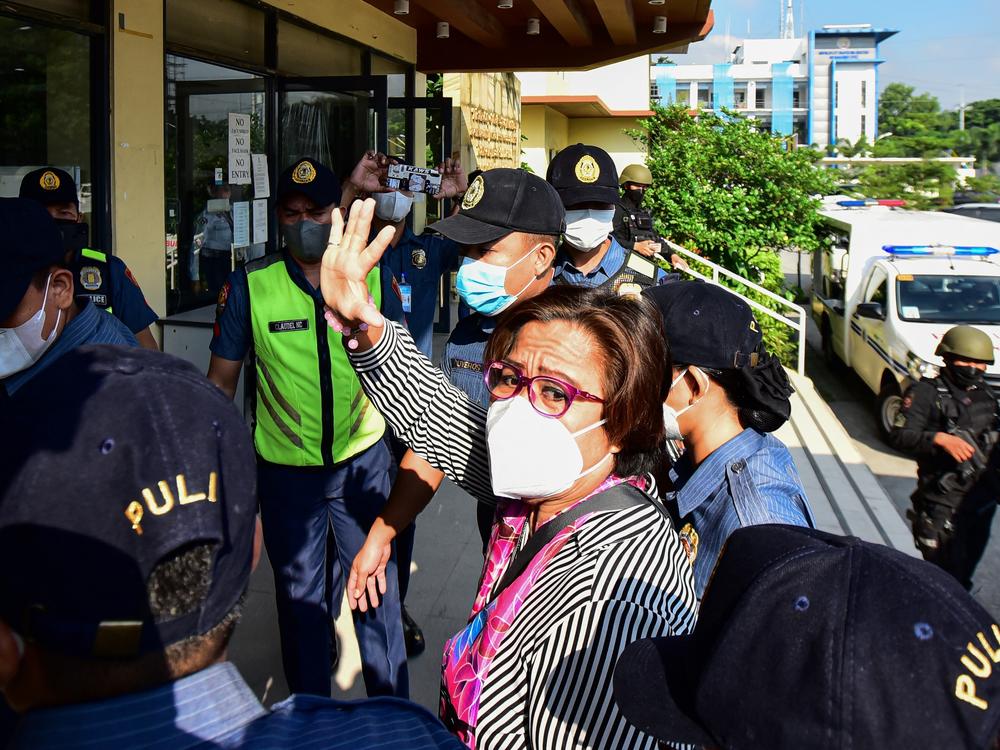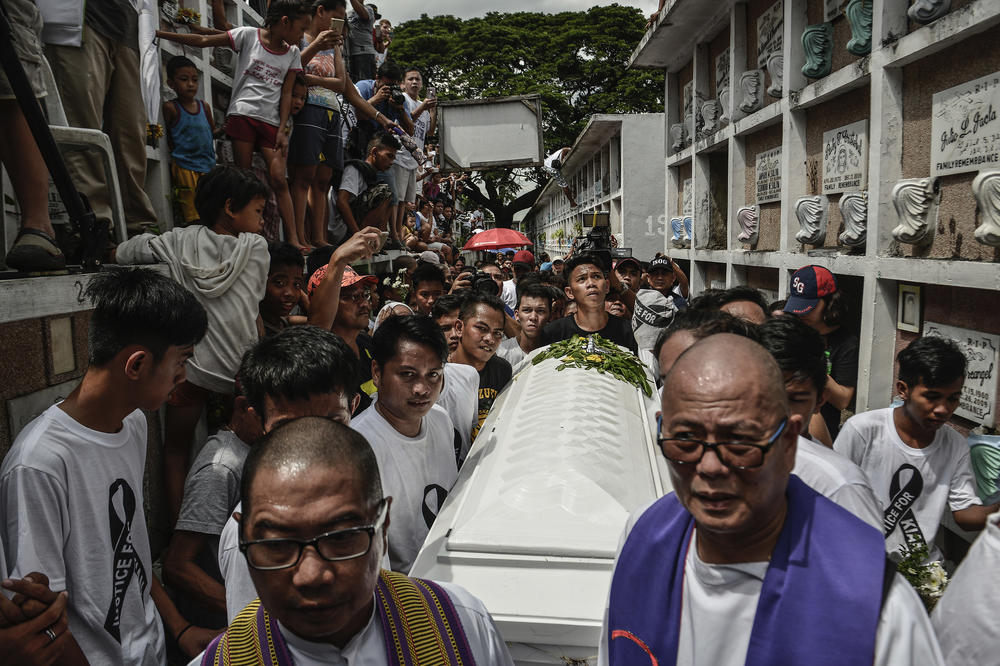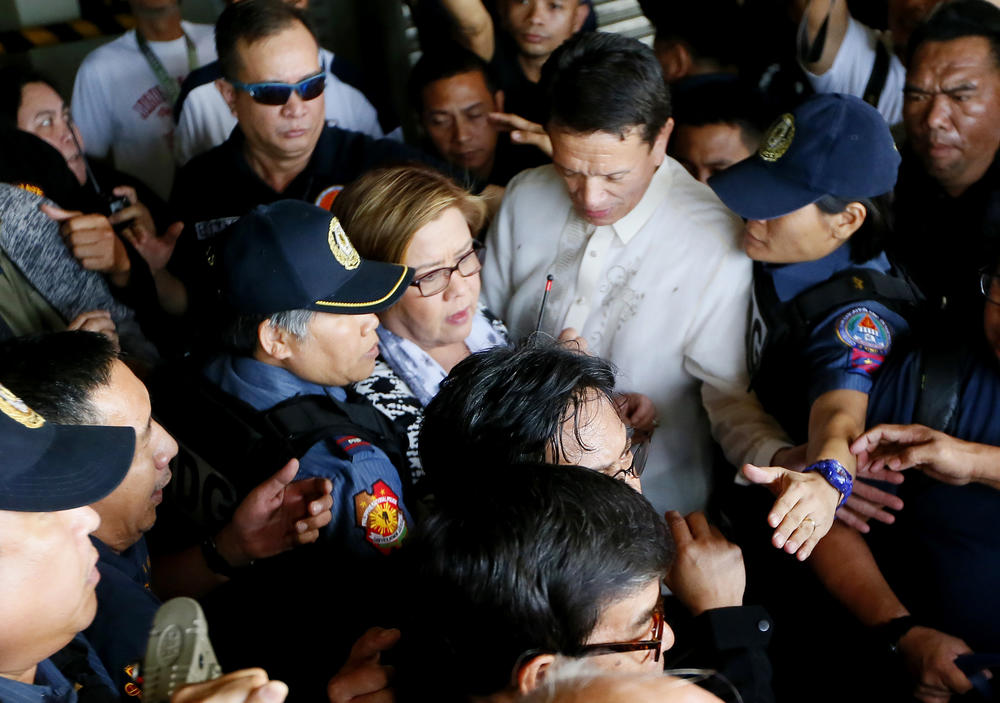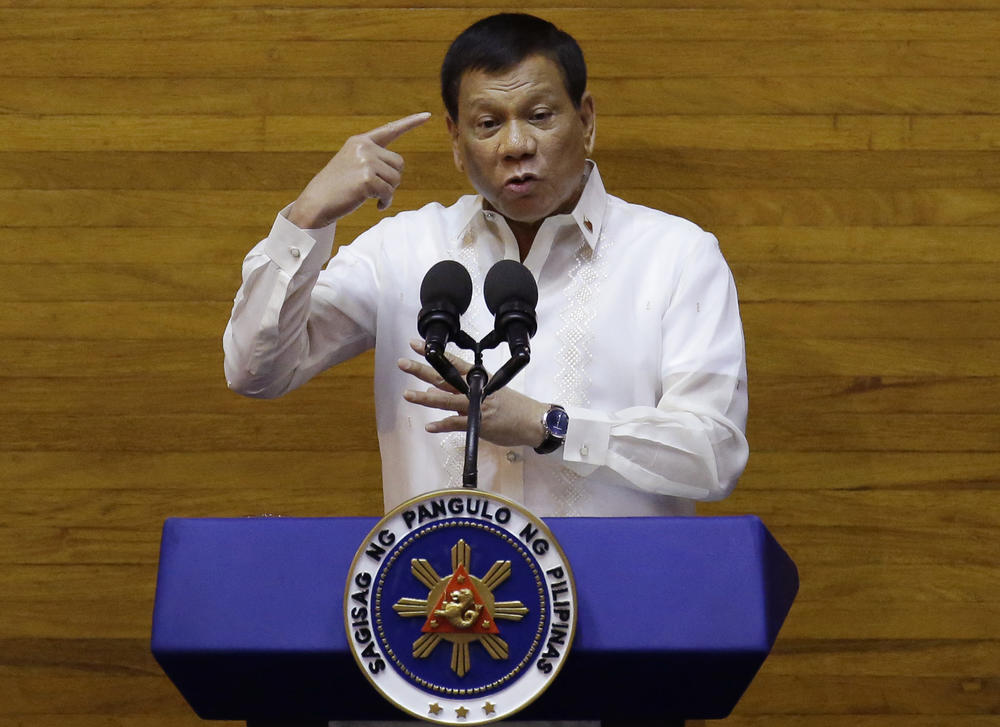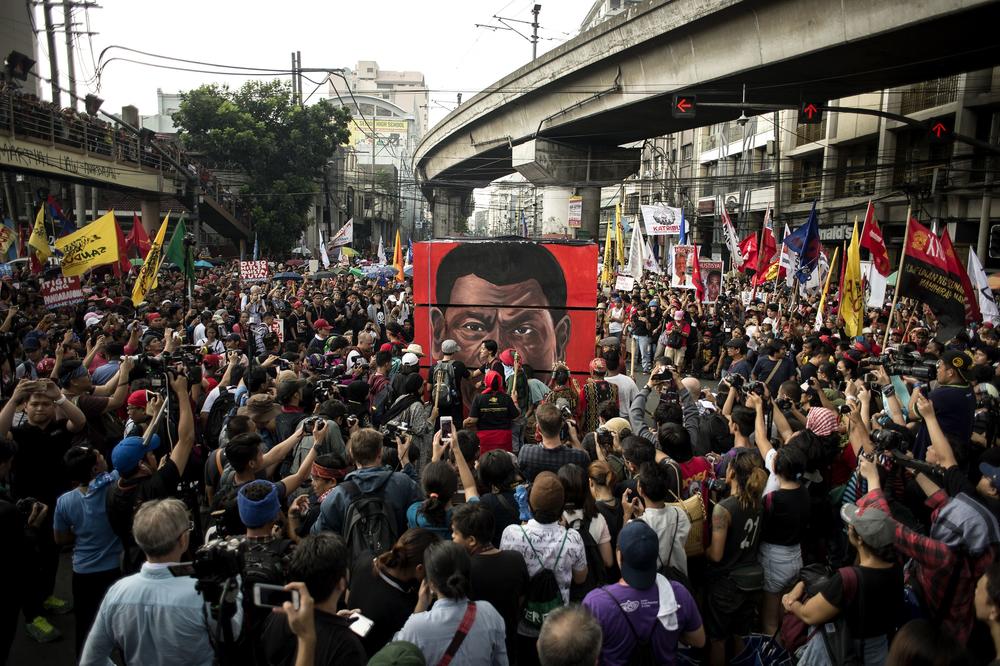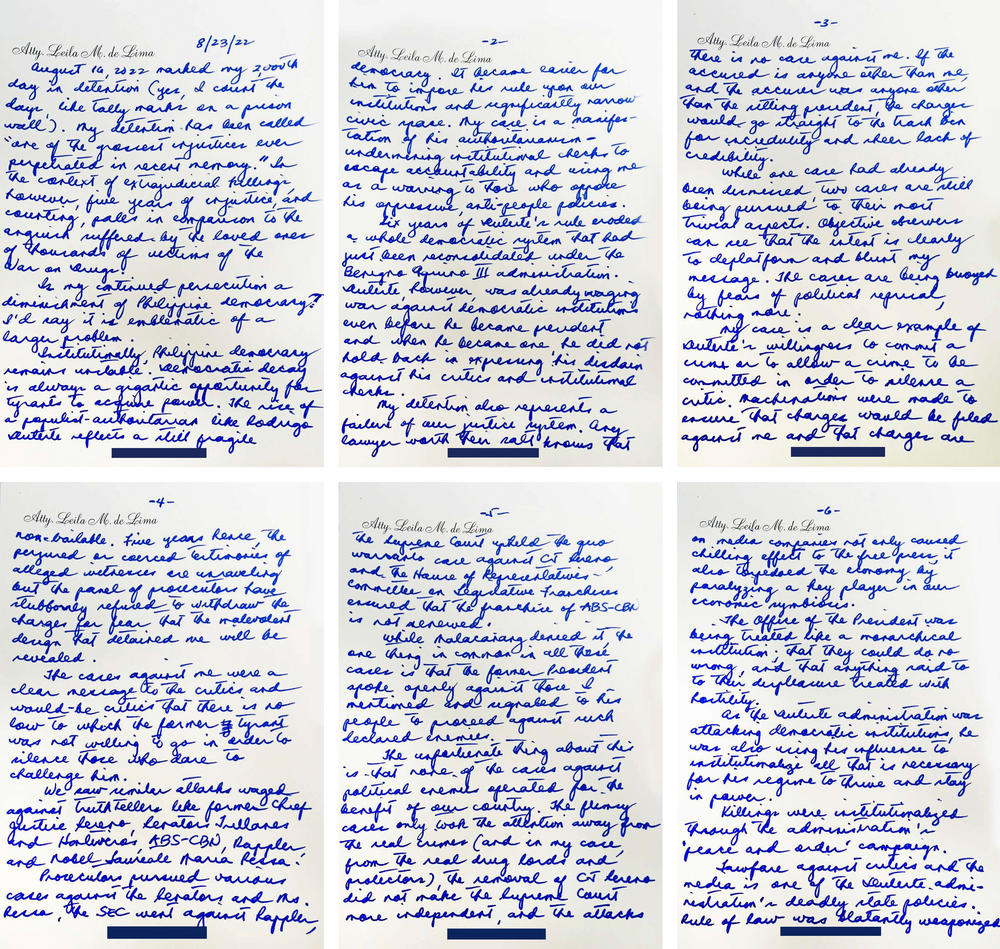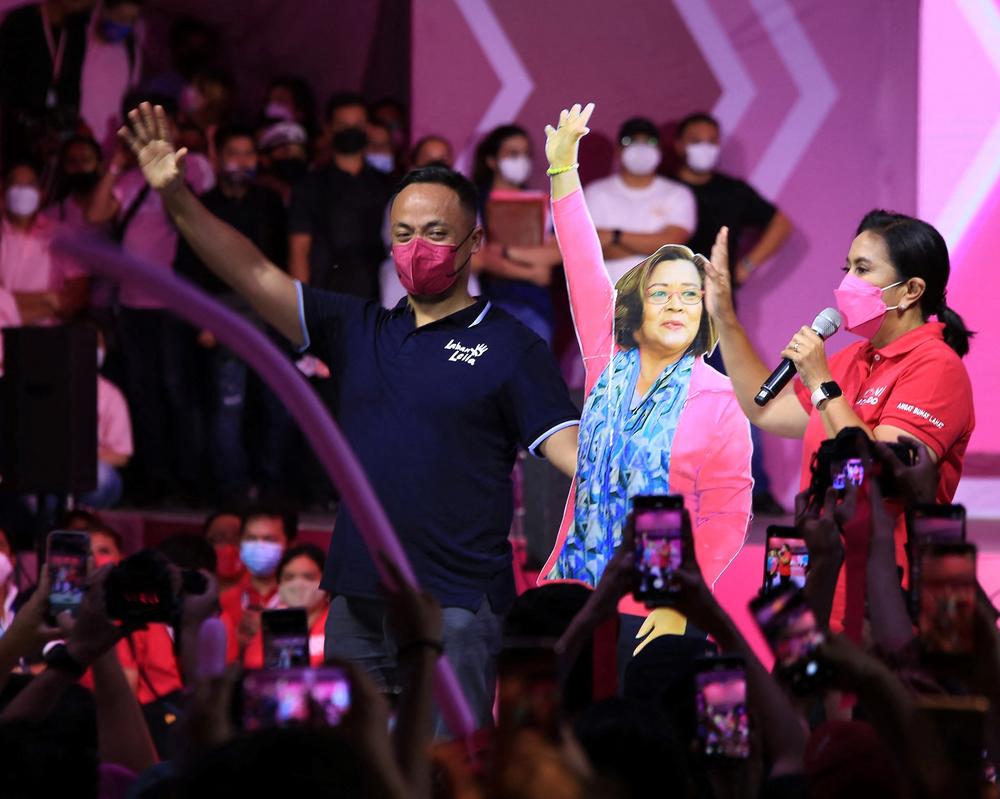Section Branding
Header Content
Jailed under Duterte, Philippine politician sends dire warnings on democracy
Primary Content
A couple dozen diehard well-wishers came to cheer on former Philippine Senator Leila de Lima in August after another one of her many court appearances. As she was led to the police bus taking her back to jail, the supporters yelled, "Free her!" and "Fake evidence!"
It happened to be on the eve of her birthday. Over cries from the crowd of "happy birthday," someone asked her birthday wish. "Always freedom and vindication — soon," de Lima brightly replied.
De Lima, who was the country's justice secretary from 2010 to 2015 and then a senator, turned 63 on Aug. 27. It was her sixth birthday in jail.
Supporters insist she is being framed for exposing abuses in then-President Rodrigo Duterte's bloody war on drugs — the subject of an investigation at the International Criminal Court into possible crimes against humanity.
De Lima has neither been convicted nor exonerated of an array of allegations — including that she received drug money — all of which she denies. Some of the drug-linked accusations have fallen apart, with the prosecution's witnesses retracting their statements. A range of people, from Philippine human rights activists to American lawmakers, are advocating for de Lima's release.
Though Duterte left office in June, de Lima's continuing detention after more than 5 1/2 years is testament to the enduring effects of Duterte's autocratic rule, her supporters say. The case highlights concerns about the state of democracy in the Philippines, and whether it shows how the right to free expression — among other democratic guarantees — can be slowly dismantled.
Human rights organizations and news reports have documented extrajudicial killings of suspected drug users, targeting of journalists and stigmatizing of rights defenders as communist insurgents committed during Duterte's term from 2016 to earlier this year.
Now there's a new president, Ferdinand Marcos Jr., the namesake son of an ousted authoritarian ruler.
Marcos has struck an ambiguous tone on Duterte's drug war. He said in a recent Associated Press interview that, "His people went too far sometimes," referring to officials under Duterte. But the Marcos government has also adopted the previous administration's position that The Hague-based International Criminal Court has no jurisdiction over the Philippines.
Asked for comment about de Lima, the Presidential Palace told NPR that it would leave the case to the trial court. The Justice Department did not respond to NPR's queries about its plans. But in a response this summer to pressure to release de Lima, Justice Secretary Jesus Crispin Remulla has said the department is leaving the matter for the court to decide.
Starting with myriad and shifting accusations under the Duterte administration, prosecutors have accused de Lima of conspiring to trade illegal drugs by using her "power, position and authority" to "extort money from high-profile inmates." They allege she allowed jailed drug lords to continue to operate their trade from the country's central New Bilibid Prison in return for money used to fund her 2016 Senate campaign.
The case illustrates how slowly the wheels of justice grind in the Philippines. All petitions for bail have been denied, and charges of bribery still loom alleging de Lima took millions of pesos from inmates as payola.
De Lima defense attorney Dino de Leon contends the government manufactured cases against his client using coerced testimony from felons with "an ax to grind." He says in 2014, de Lima actually got tough on jailed kingpins and raided the country's maximum-security prison as justice secretary, dismantling the luxurious accommodations of drug baron inmates.
But by the time she was elected to the Senate in 2016, opponents were accusing de Lima of coddling drug lords, a charge she refuted on the floor of the Senate at the time. "This is not only an attack on me but on any senator who dares to be outspoken," she said. De Lima also denounced abuses of Duterte's national war on drugs just as it was getting underway.
"We cannot wage the war against drugs with blood," she said. "We will only be trading drug addiction with another more malevolent kind of addiction. And this is the compulsion for more killing — killings that have now included even the innocent," de Lima said.
The Philippines DEA says that, as of the end of May, 6,252 Filipinos have been killed in police narcotics operations since 2016. Rights groups say the number could be as high as 30,000.
An early critic of those anti-drug operations, de Lima first crossed swords with Duterte when she chaired the Philippines' Commission on Human Rights. Duterte was then mayor of Davao City, where, according to Human Rights Watch, "death squads" were deployed to clear the streets of alleged drug dealers, petty criminals and street children.
When de Lima launched a Senate investigation against Duterte's nationwide drug war in 2016, colleagues blamed her for sullying the image of the Philippines, and side-lined her.
Duterte quipped at the time that de Lima was trying to "implicate" him but she would be the one going to jail if the drug links alleged against her were proven, as drug offenses are non-bailable in the Philippines.
"If those connections are true, she will rot in jail. She will rot in jail. It's no bail," Duterte said.
Throughout, Duterte has been unyielding regarding the carnage of the anti-narcotic operations, saying that drugs traffickers were "destroying" the country. "I will never, never apologize for the deaths," Duterte said at the start of the year. "Kill me, jail me, I will never apologize."
Many Filipinos don't share de Lima's ardency about human rights. A survey by the pollster Social Weather Stations found that while 3 out of 4 Filipinos saw "many" human rights abuses in the drug war, most continued to support it, and its architect. Duterte left office with an 81% "satisfaction rating" among Filipinos, according to the pollster.
De Lima penned a handwritten statement in response to questions from NPR delivered through her staff. She says she has lost her freedom because of vengeance. She says it demonstrates how "a fragile democracy can be dismantled in the bat of an eye."
"My case is a clear example of Duterte's willingness to commit a crime or to allow a crime to be committed," she says, "in order to silence a critic."
De Lima says there have been "similar attacks waged against truth-tellers," including a former chief justice and Duterte critic, whose removal for allegedly failing to disclose all of her assets was seen as an assault on judicial independence.
De Lima also mentions Nobel Peace Prize recipient Maria Ressa, journalist and founder of the website Rappler, targeted for investigations of the drug war and reporting on human rights abuses.
"The office of the President," de Lima writes "was being treated like a monarchical institution."
Socorro Reyes, a member of the Free Leila Committee and de Lima's university professor, says her jailing "only shows how effective, how powerful government propaganda can be."
Reyes says the Philippines is part of a broader assault on liberal democratic values across the globe, and that de Lima's treatment reflects the crass tactics, including misogynistic messaging, that are deployed to undermine government critics.
The compliant Philippine House of Representatives went so far as to threaten to play a sex video ostensibly featuring the one-time senator. "It's the height of what you can do to a woman," Reyes says. "So what we did was we started posting, "I am the woman in the video — I am the woman in the sex video and I'm ready to appear." The House dropped the idea of any video show.
Reyes notes that de Lima spent nearly her entire Senate term isolated in detention, with no computer or cellphone and only occasional visitors and stray cats to keep her company. Yet, Senate colleagues say de Lima still managed to write influential legislation — by hand — supporting the poor and elderly. She lost reelection in May.
Political lecturer Arjan Aguirre of Ateneo de Manila University says Duterte carried out "a political vendetta" against de Lima. But he says Duterte targeted critics selectively so that Filipinos would not perceive a threat to their democracy overall.
"They still think that we are in a democratic society," he says, and that Rodrigo Duterte was "trying his best to save us from an oligarchic rule."
Legal and human rights observers say closing in on six years, de Lima's imprisonment may look more clearly like "arbitrary detention." Defense lawyer de Leon explains one case has been dismissed. Two key witnesses retracted their stories in a second case. And in a third case, the evidence relies mainly on statements from convicted felons. De Leon says the defense might be able to show the government is actually "using its machinery to persecute an innocent person — but that has to be proven."
A group of U.S. senators wants President Marcos to right what they call the "injustices of his predecessor" and clear de Lima of any wrongdoing. Massachusetts Democrat Senator Ed Markey recently led a delegation to Camp Crame inside the Philippines' National Police Headquarters in Quezon City to visit the woman he calls a "prisoner of conscience."
Previously, Duterte barred U.S. lawmakers from seeing de Lima. So, Markey declared that his August visit offered a sign of "progress."
But while releasing de Lima could burnish the country's sullied human rights image, analyst Aguirre cautions that Marcos will try to avoid alienating the very Duterte political base that helped elect him, and thus freeing de Lima may not be on Manila's agenda.
"They will do more calculations. And my understanding is that they will stick to the status quo. And they will not release Senator de Lima, soon."
Aika Rey contributed to this report from Manila.
Copyright 2022 NPR. To see more, visit https://www.npr.org.
